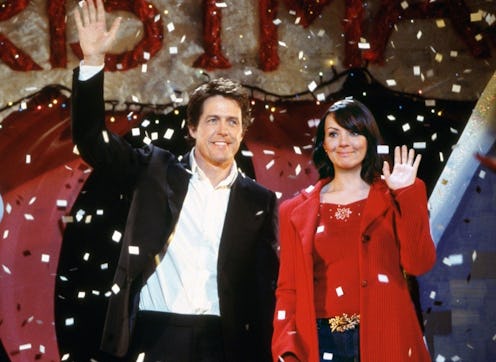Entertainment
'Love Actually' Has A Gender Role Problem

Since its release in 2003, Love Actually has quickly become a holiday classic that many people religiously watch every December. I certainly think the film has its merits — far be it from me to ignore its charming British setting, stellar cast, and the first version of "All I Want For Christmas" that I have ever enjoyed. (Sorry, Mariah Carey — but you've got nothing on Joanna.) Still, as much as I hate to be the Grinch in the room, I have to point out that the gender roles and power dynamics in Love Actually are problematic — specifically because, in the majority of the film's relationships, the men both figuratively and literally hold the power. Since it's a bit difficult to keep track of all the film's couples, let's talk about the two love stories that arguably have the happiest endings, because both happen to be between a male boss and his female subordinate.
I'll start with the newly elected Prime Minister, David, and Natalie, a junior household staffer whose exact job title remains a mystery. When David first meets Natalie, he's immediately interested in her because he finds her nervousness endearing. After their initial meeting, they barely converse, but it's the highlight of his day when she serves him tea and biscuits. Of course, it's understandable that David is hesitant to act on his feelings — I'm not sure how the HR department at the Prime Minister's office works, but I just have a feeling it would be complicated.
When David believes something has happened between Natalie and the United States President, he immediately has her transferred to a different job. David doesn't bother to consult with Natalie about this change — he simply asks another staffer to reassign her. This move really drives home the point that he's her superior and is in complete control of both her career and the amount of contact they'll have. They don't see each other again until a Christmas card inspires David to dash from door to door on Natalie's street in desperate search of her. Again, his position of power allows him to call all the shots in this burgeoning romance. If Natalie had pursued David, it probably would have been viewed as inappropriate. But that standard doesn't apply to David. When he doesn't want to deal with his feelings for her, he has her transferred so he doesn't have to see her. And, when it suits his fancy, he runs to Natalie's door, at which point she doesn't confront him about his aforementioned cowardly move.
Then, there's Jamie and Aurélia. After the devastating realization that his girlfriend is cheating on him (with his own brother, no less), Jamie heads to his French cottage to write his new book. While his housekeeper Aurélia serves him tea (I'm sensing a pattern here), she accidentally causes his manuscript pages to blow away into the nearby pond. As she takes off her clothes to dive in after them, Jamie has an epiphany — he's in love! They don't speak the same language and therefore have never had an actual conversation, but that's neither here nor there.
When he returns to England, Jamie begins taking Portuguese lessons so he can propose to Aurélia in her native tongue. Yes, this is a sweet and charming gesture — but, as Christopher Orr of The Atlantic points out, it's also just one example of the movie's message that falling in love doesn't require any actual conversation.
The fact that two of the film's central romances are between a male boss and a female subordinate is simultaneously sexist and cliché — there's a "naughty secretary" in the mix as well, but at least that plotline isn't presented as a beautiful love affair. Since there's so little conversing in these romances, it means the attraction is either purely physical, directly related to the idea of a woman's role to "serve," or both. I'm not saying that a genuine, respectful romance couldn't occur between two individuals under these circumstances — but it would be decidedly complicated and require maturity, conversation, and compromise.
And, hey, last time I checked, this is the 21st century and there are plenty of women in leadership roles. It would have been interesting and worthwhile for Love Actually to explore the dynamics between a female boss and her male subordinate too. My Christmas wish is for the next holiday-themed, ensemble romance blockbuster to include more progressive gender roles — because there's nothing sexier than equality.
Images: Universal Pictures; Giphy (2)